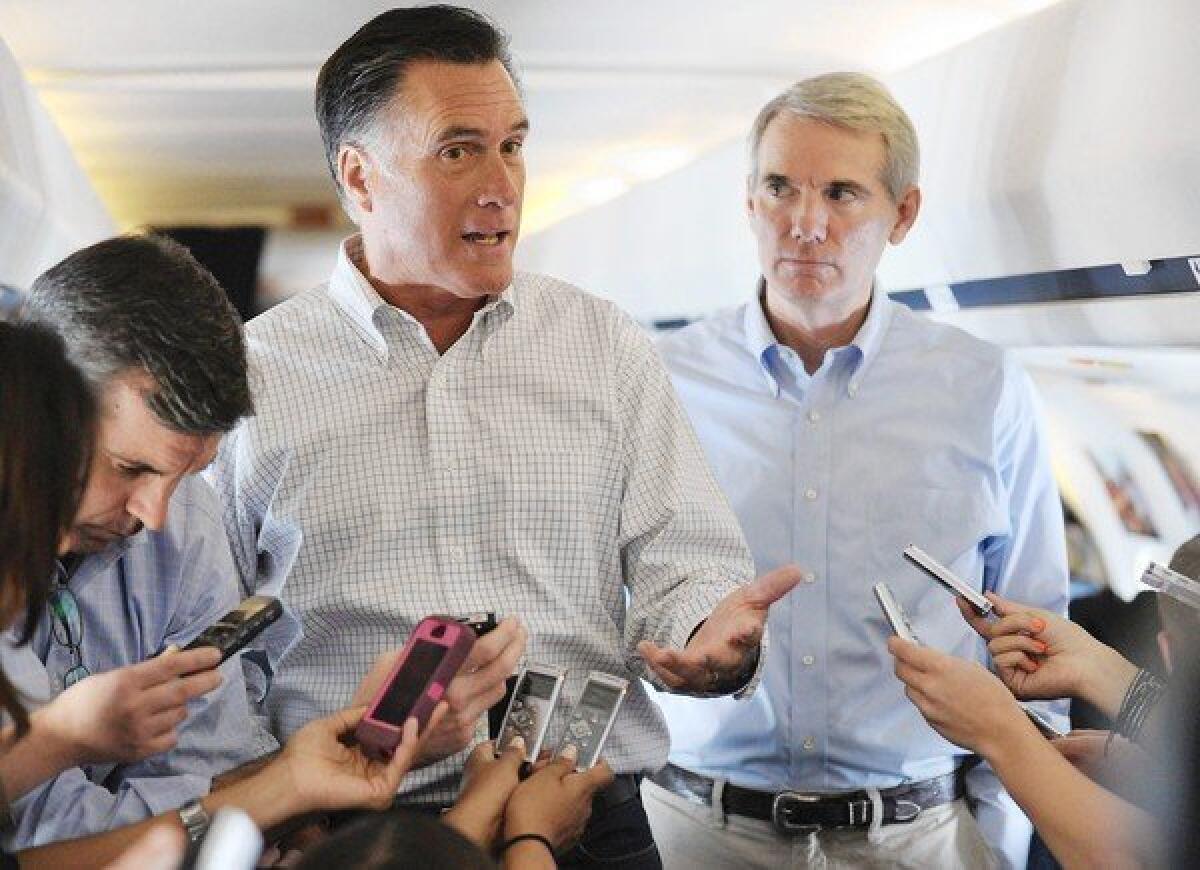Wait for it -- Romney’s media rebound

So it’s over. Mitt Romney is now on his way to political oblivion. To hear the media tell it, a lukewarm convention, his gaffe accusing President Obama of apologizing to seething Muslim masses and his remarks at a fundraiser in which he impugned nearly half the country as self-pitying victims have done him in. A month ago, he was a candidate with a bulging war chest facing an opponent saddled with a creaky economy. Now he’s toast.
But not so fast.
Here’s a prediction. Regardless of what Romney does — even if he continues to stick both feet in his mouth — he is very likely to see his fortunes rise. That’s because it is an iron law of American presidential campaign coverage that what goes up must come down and, conversely, what is down must go up. In short, Romney is going to be the beneficiary of what you might call the “media bounce.”
COMMENTARY AND ANALYSIS: Obama vs. Romney
The idea of a media bounce has very little to do with either Romney or Obama. In fact, it has very little to do with any candidate. It has to do with certain proclivities within the American media. As political scientist Thomas Patterson described it in his 1994 study of campaign coverage, “Out of Order, “ the media really have only four stories to tell: a candidate is winning or losing, gaining ground or losing ground. And he adds, “The press have a distinct narrative for each situation,” which is why the coverage of one presidential election pretty much mirrors the coverage of every other election. In the media, every campaign is basically a sequel.
But, as Patterson also shows, these stories are not static. They are dynamic, and they are serial. They provide a narrative arc for the entire campaign, replete with twists and turns. When a candidate is riding high, the media magnify his success, creating a bandwagon effect. They tout his campaigning prowess, his human touch, his political instincts — while, of course, telling us how his opponent founders.
And then something strange happens. Suddenly, with the slightest misstep, the aforementioned perfect candidate finds journalists saying that his prowess is faltering, his touch failing. The “losing ground” narrative kicks in, and guess what? Just as suddenly the once-trailing candidate is gaining ground.
INTERACTIVE: Battleground states
His campaign has righted itself, he has become better on the stump, and his poll numbers are likely to rise.
In both cases, the media are magnifying small blips into large mountains. As Patterson puts it, “Journalists reason from effect to cause.” If a candidate hits a bump or his numbers flag, they will adduce all sorts of reasons why, which only serves to accentuate what it is they are reporting.
One need look no further than the Republican primaries to test this hypothesis. A recent Pew Center study showed that throughout the race for a GOP nominee, the candidates were on a kind of roller coaster of positive and negative coverage. Romney, the putative front-runner who had been celebrated as battle tested, found his coverage getting increasingly negative as his campaign wore on. It was new candidate Gov. Rick Perry of Texas who found his coverage growing more positive as Romney’s grew more negative, until Perry’s slips created a deluge of negative coverage. That led to what Pew calls a “going good” narrative for Romney.
Until he lost to Newt Gingrich in South Carolina, which, in turn, led to a short burst of positive coverage for Gingrich, and to the new meme that Romney was a candidate who couldn’t “close the deal.” Then it was Rick Santorum’s turn for good coverage. It wasn’t until Romney beat Santorum in Michigan that the media jumped back on his bandwagon and made him the inevitable choice. It was the media that was at the roller coaster controls.
Why the political press raiseth up only to taketh down, and vice versa, is a matter of speculation. One observer attributes it to a “subliminal mother instinct” among journalists that helps sinking candidacies. Others, including Patterson, pin it to the “story imperative” of the media — the need to turn everything into a drama or risk losing readers and viewers. A campaign without suspense would be a dull campaign indeed, so the media give that suspense a little nudge. Not incidentally, it also makes reporters the creators of the campaign narrative and not just its passive recorders.
While you can’t discount this entertainment function, there is another possibility. The mainstream political media pride themselves on their objectivity. To redress an imbalance, even when they have contributed to it, is one way to demonstrate that objectivity and even-handedness — a demonstration, by the way, that seems even more necessary when those on the right are constantly caterwauling about liberal media bias. In effect, the media rig the race by constantly modulating it, which may be the biggest bias of all.
So Romney will have his day again, probably sooner than later. So long as he is passable in the debate on Oct. 3, the response is likely to be that he performed very well, that his campaign has finally found its footing and that he has regained his mojo. And that Obama may be losing his. That is the way campaigns are covered in America.
It is practically guaranteed.
Neal Gabler is at work on a biography of Sen. Edward M. Kennedy.
More to Read
A cure for the common opinion
Get thought-provoking perspectives with our weekly newsletter.
You may occasionally receive promotional content from the Los Angeles Times.










